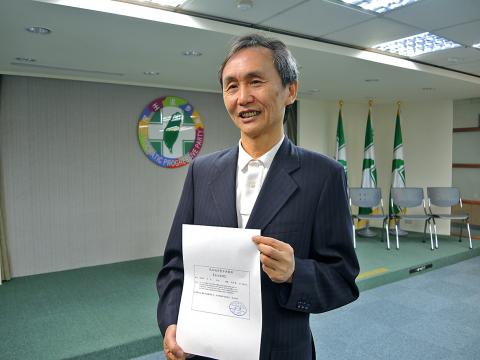A proposal by online news outlet My-Formosa.com vice chairman Wu Tzu-chia (吳子嘉) and former Democratic Progressive Party (DPP) legislator Kuo Cheng-liang (郭正亮) — both DPP members — to revise the party charter’s clauses on Taiwanese independence drew mixed reactions.
“We are not trying to freeze the clauses on Taiwanese independence, we are not even proposing anything concrete,” Wu told reporters at the DPP headquarters in Taipei. “The party charter and many of the party’s major resolutions contradict each other and the charter denies the Republic of China [ROC], which is not in accordance with the political situation.”
“The political situation is that President Tsai Ing-wen (蔡英文) was sworn in as the ROC president under the ROC Constitution — the party should catch up with the president and the government,” Wu said.

Photo: CNA
Article 1 of the DPP charter, passed in 1991, states that it is the party’s objective to establish a sovereign and independent Republic of Taiwan.
In 1999, the DPP adopted the Resolution on Taiwan’s Future, which says that Taiwan is already a sovereign and independent nation, and therefore any change of status must be decided by the people of Taiwan.
In 2007, the DPP passed the Resolution on Normalization of the Nation, which reaffirmed that Taiwan is a sovereign and independent state, but added that due to pressure from China, Taiwan could not sustain a role in the international community as a “normal nation,” and therefore the party would push for the “normalization” of Taiwan’s status in the international community.
Wu and Kuo said that as Tsai’s proposal to maintain the cross-strait “status quo” won overwhelming public support in the presidential and legislative elections in January, it is time for the DPP to catch up with mainstream public opinion and propose something new in the party charter.
The proposal asks the DPP’s Central Executive Committee to amend the party charter, Wu said.
Formally proposed by 32 party delegates and endorsed by 35, the proposal would be discussed in the DPP national congress next month.
Wu said that he is just a member so he and Kuo are only the planners of the proposal.
DPP spokesperson Wang Min-sheng (王閔生) said that every party delegate has the right to make proposals and any proposal may be discussed in the party’s national congress.
“However, the core value of the DPP that the future of Taiwan should be decided by its people will absolutely not change,” Wang said.
Taoyuan Mayor Cheng Wen-tsang (鄭文燦), when asked to comment on the issue in a radio interview, said that while it does not hurt to have such discussions in the party’s national congress meeting, “the existing Resolution of Taiwan’s Future already includes the idea of maintaining the cross-strait ‘status quo.’”
Former DPP legislator Lin Cho-shui (林濁水) criticized the new proposal.
“Recently some people have been criticizing ‘independence’ as an extreme political doctrine, therefore the DPP should adopt a clause to maintain the ‘status quo’ and give up Taiwanese independence,” Lin said. “Why is every American saying that the US is an independent nation? Why are China, Japan, Germany and all nations believe they are independent nations?”
“Perhaps the truth is that every nation in the world follows some extreme political doctrine and Taiwan should be the only ‘non-independent’ nation in the world to be non-extreme,” Lin said.

Alain Robert, known as the "French Spider-Man," praised Alex Honnold as exceptionally well-prepared after the US climber completed a free solo ascent of Taipei 101 yesterday. Robert said Honnold's ascent of the 508m-tall skyscraper in just more than one-and-a-half hours without using safety ropes or equipment was a remarkable achievement. "This is my life," he said in an interview conducted in French, adding that he liked the feeling of being "on the edge of danger." The 63-year-old Frenchman climbed Taipei 101 using ropes in December 2004, taking about four hours to reach the top. On a one-to-10 scale of difficulty, Robert said Taipei 101

Nipah virus infection is to be officially listed as a category 5 notifiable infectious disease in Taiwan in March, while clinical treatment guidelines are being formulated, the Centers for Disease Control (CDC) said yesterday. With Nipah infections being reported in other countries and considering its relatively high fatality rate, the centers on Jan. 16 announced that it would be listed as a notifiable infectious disease to bolster the nation’s systematic early warning system and increase public awareness, the CDC said. Bangladesh reported four fatal cases last year in separate districts, with three linked to raw date palm sap consumption, CDC Epidemic Intelligence

US climber Alex Honnold left Taiwan this morning a day after completing a free-solo ascent of Taipei 101, a feat that drew cheers from onlookers and gained widespread international attention. Honnold yesterday scaled the 101-story skyscraper without a rope or safety harness. The climb — the highest urban free-solo ascent ever attempted — took just more than 90 minutes and was streamed live on Netflix. It was covered by major international news outlets including CNN, the New York Times, the Guardian and the Wall Street Journal. As Honnold prepared to leave Taiwan today, he attracted a crowd when he and his wife, Sanni,

Taiwanese and US defense groups are collaborating to introduce deployable, semi-autonomous manufacturing systems for drones and components in a boost to the nation’s supply chain resilience. Taiwan’s G-Tech Optroelectronics Corp subsidiary GTOC and the US’ Aerkomm Inc on Friday announced an agreement with fellow US-based Firestorm Lab to adopt the latter’s xCell, a technology featuring 3D printers fitted in 6.1m container units. The systems enable aerial platforms and parts to be produced in high volumes from dispersed nodes capable of rapid redeployment, to minimize the risk of enemy strikes and to meet field requirements, they said. Firestorm chief technology officer Ian Muceus said